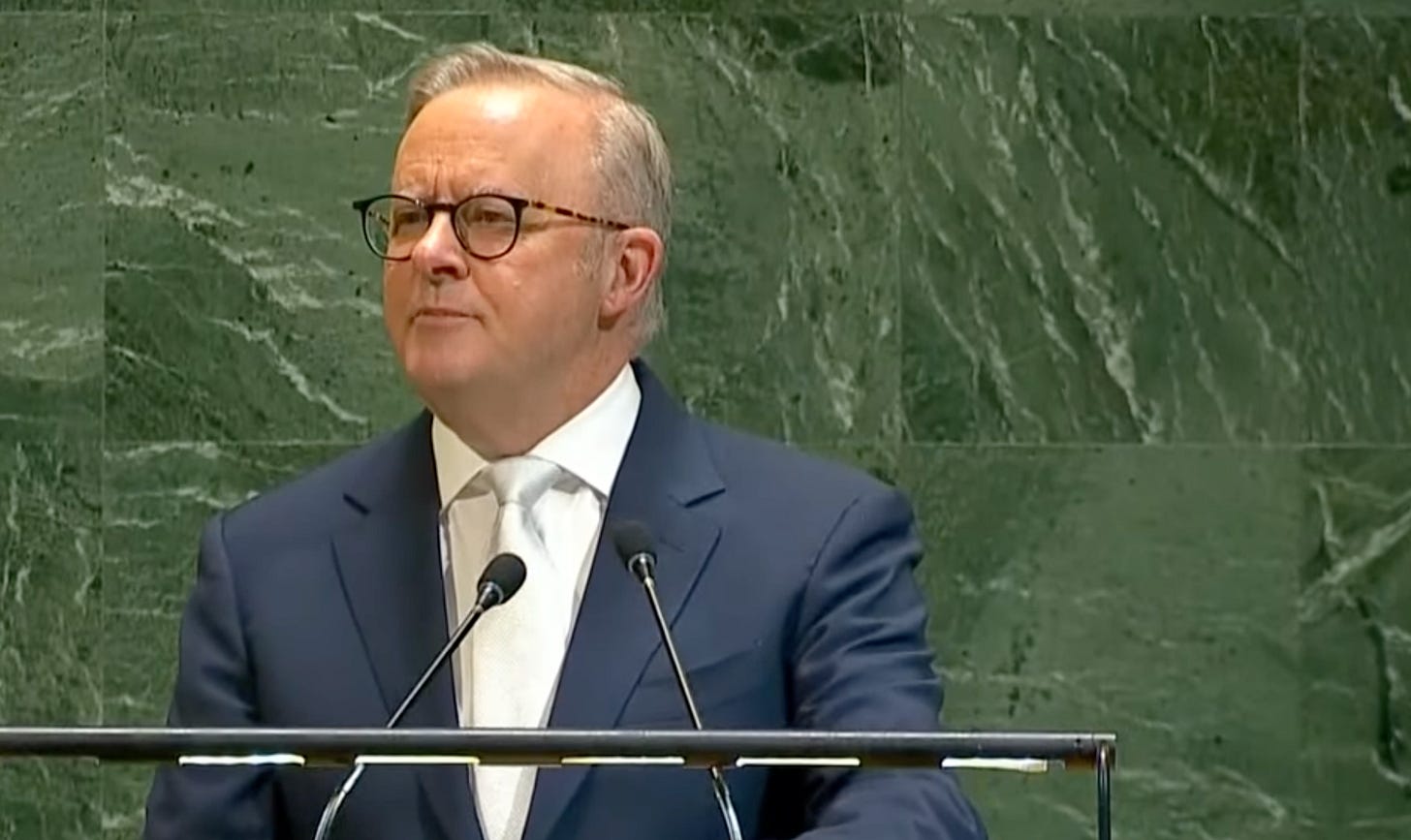Australia Recognizes Palestinian State, Calls for Middle East Ceasefire at UN Address
Today’s Article is brought to you by Empower your podcasting vision with a suite of creative solutions at your fingertips.
This piece is freely available to read. Become a paid subscriber today and help keep Mencari News financially afloat so that we can continue to pay our writers for their insight and expertise.
Australian Prime Minister Anthony Albanese announced this week that his government has formally recognized the state of Palestine, marking a major shift in Canberra’s Middle East policy as he called for an immediate ceasefire in Gaza during his first address to the United Nations General Assembly.
“Australia recognised the state of Palestine because we are determined to save succeeding generations from the scourge of war,” Albanese told world leaders Wednesday, quoting from the UN Charter in a speech that tackled climate targets, regional security threats and humanitarian crises.
The recognition comes as international pressure mounts for a resolution to the conflict between Israel and Hamas. Australia joins more than 140 nations that have recognized Palestinian statehood, though the move puts Canberra at odds with key allies including the United States.
Truth matters. Quality journalism costs.
Your subscription to Mencari directly funds the investigative reporting our democracy needs. For less than a coffee per week, you enable our journalists to uncover stories that powerful interests would rather keep hidden. There is no corporate influence involved. No compromises. Just honest journalism when we need it most.
Not ready to be paid subscribe, but appreciate the newsletter ? Grab us a beer or snag the exclusive ad spot at the top of next week's newsletter.
Albanese said Australia is demanding the immediate release of hostages held by Hamas, the flow of humanitarian aid to desperate civilians and ensuring that “the terrorists of Hamas have no role in Gaza’s future.”
“For decades, leaders have come to this podium in search of new words and new ways to call the world to action on a two-state solution,” Albanese said. “Today, I look to words that Australia helped write 80 years ago.”
The prime minister framed the Palestine recognition within the UN’s founding principles, asking the assembly when those ideals could hold meaning if not applied to the Middle East now.
Iran Ambassador Expelled Over Synagogue Attack
In a separate security announcement, Albanese confirmed that Australia expelled Iran’s ambassador last month after security agencies determined Tehran orchestrated attacks on Jewish targets in Melbourne and Sydney.
“Just last month, Australian security agencies confirmed that the Iranian regime orchestrated the firebombing of a synagogue in Melbourne and a Jewish restaurant in Sydney,” Albanese said. The expulsion marked the first time since World War II that Australia has taken such diplomatic action.
“There is no place for anti-Semitism,” Albanese told the assembly, calling the attacks “criminal acts of cowardice aimed at spreading fear.”
Climate Targets and Clean Energy Push
Australia set an ambitious new emissions reduction target for 2035, pledging to cut greenhouse gases by 62% to 70% compared with 2005 levels. The announcement builds on the country’s existing 2030 commitment of a 43% reduction.
“Our target is ambitious, but importantly, it is achievable,” Albanese said. “And more than anything else, Australia’s embrace of clean, renewable energy will get us there.”
The prime minister positioned clean energy as enabling rapidly growing Indo-Pacific economies to industrialize and decarbonize simultaneously. He argued this approach eliminates the false choice between economic growth and environmental responsibility.
Australia is also bidding to co-host the 31st Conference of the Parties climate summit with Pacific island nations. Albanese called climate change an existential threat for Pacific countries, describing them as “nations for whom climate change is more than an environmental challenge.”
Security Council Bid and Regional Diplomacy
Albanese announced Australia will seek a seat on the UN Security Council for the 2029-30 term, emphasizing that middle powers and small nations need platforms to voice aspirations.
“The United Nations is much more than an arena for the great powers to veto each other’s ambitions,” he said. “This is a platform for middle powers and small nations to voice and achieve our aspirations.”
The prime minister outlined Australia’s regional strategy, which includes deepening engagement with ASEAN, elevating partnerships with Indonesia, India, South Korea and Japan, and breaking new ground with allies including the United Kingdom, European Union and the United States.
“We see mutual understanding, shared prosperity and economic cooperation as the most powerful counterpoints to confrontation, to isolation or conflict,” Albanese said.
Ukraine Support and Global Challenges
Australia reaffirmed its support for Ukraine against Russia’s invasion, with Albanese declaring his country shares the resolve of coalition partners to secure peace on Ukraine’s terms.
“As a nation that knows security depends on sovereignty, Australia stands with the courageous people of Ukraine in their struggle against Russia’s illegal and immoral invasion,” he said.
The speech addressed multiple security threats facing the international community, including dictators whose power derives from cruelty, autocracies using technology to undermine democratic institutions, and intimidation on seas and in the skies that endangers lives and risks escalation.
Humanitarian Protection Initiative
Australia and partner nations launched the Declaration for the Protection of Humanitarian Personnel this week, which has been endorsed by more than 100 countries.
“As a people who believe that kindness is an act of courage, we want to see aid workers delivering food, water and medicine to conflict zones protected,” Albanese said.
The initiative aims to safeguard humanitarian workers operating in conflict zones around the world.
Historical Context and UN Reform
Albanese repeatedly invoked the UN’s 80-year history and Australia’s role in shaping the institution. He noted that Australia helped draft the UN Charter and participated in the first peacekeeping operation under UN authority, supporting Indonesian independence.
The prime minister credited Australian activist Jessie Street, one of only eight women among 850 delegates at the 1945 San Francisco conference, for ensuring the charter specifically mentioned sexual discrimination.
“Where the rules are silent, women are not usually considered,” Albanese said, quoting Street’s reasoning.
He called for UN reform to better serve current needs, arguing that the institution’s value is “not counted in decades, it is measured in deeds.”
“The true value of the United Nations is not counted in decades, it is measured in deeds, in actions that make a positive difference to people’s lives,” Albanese said.
Trade and Labor Standards
As the leader of an economy in what he called “the fastest growing region of the world in human history,” Albanese championed free and fair trade while advocating for workers to share in prosperity through better wages, safer workplaces and elimination of exploitation and modern slavery.
Australia supports maritime security through the UN Convention on the Law of the Sea, including in the South China Sea, to protect communications and travel routes that make trade possible.
Papua New Guinea Alliance
Albanese announced that Papua New Guinea, which celebrated its 50th independence anniversary last week, will soon become Australia’s newest ally.
“In the early days of this assembly, Papua New Guinea was considered an Australian territory,” he said. “And last week, that proud nation celebrated the 50th anniversary of its independence. And soon, Australia’s nearest neighbour will become our newest ally.”
The announcement signals deepening Pacific partnerships as Australia works to strengthen regional security and counter growing Chinese influence in the area.
Call to Action
In closing remarks, Albanese urged the international community to trust in shared humanity and choose collective success over individual failure.
“More than ever, we must work to see the promises of this place deliver real progress for the people that we serve,” he said. “More than ever, we must work to build a future true to the United Nations noble purpose and worthy of our people’s greatest qualities.”
The prime minister warned against stepping back from international cooperation, arguing that doubting the value of collaboration makes conflict the default option.
“If we resign ourselves to the idea that war is inevitable or relegate ourselves to the status of disinterested bystanders, if our only response to every crisis is to insist that there is nothing we can do, then we risk being trusted with nothing,” Albanese said.
He emphasized that Australia values dialogue and diplomacy as vital roads to understanding, not dead ends, and will continue playing its part in international cooperation.
The speech marked Albanese’s first address to the UN General Assembly as prime minister, coming at a time of heightened global tensions over conflicts in Ukraine, Gaza and rising concerns about authoritarian expansion in the Indo-Pacific region.
Sustaining Mencari Requires Your Support
Independent journalism costs money. Help us continue delivering in-depth investigations and unfiltered commentary on the world's real stories. Your financial contribution enables thorough investigative work and thoughtful analysis, all supported by a dedicated community committed to accuracy and transparency.
Subscribe today to unlock our full archive of investigative reporting and fearless analysis. Subscribing to independent media outlets represents more than just information consumption—it embodies a commitment to factual reporting.
As well as knowing you’re keeping Mencari (Australia) alive, you’ll also get:
Get breaking news AS IT HAPPENS - Gain instant access to our real-time coverage and analysis when major stories break, keeping you ahead of the curve
Unlock our COMPLETE content library - Enjoy unlimited access to every newsletter, podcast episode, and exclusive archive—all seamlessly available in your favorite podcast apps.
Join the conversation that matters - Be part of our vibrant community with full commenting privileges on all content, directly supporting The Evening Post (Australia)
Catch up on some of Mencari’s recent stories:
It only takes a minute to help us investigate fearlessly and expose lies and wrongdoing to hold power accountable. Thanks!








